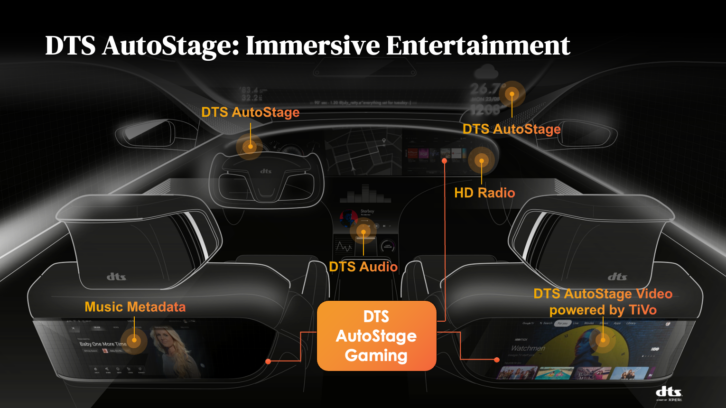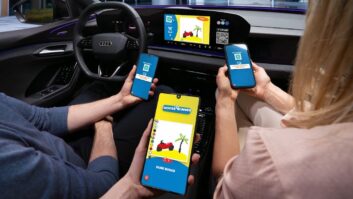Radio World’s “Guest Commentaries” section provides a platform for industry thought leaders and other readers to share their perspective on radio news, technological trends and more. If you’d like to contribute a commentary, or reply to an already published piece, send a submission to [email protected].
This year at CES, Xperi announced the development of a prototype feature we’ve been working on for our DTS AutoStage entertainment platform: in-vehicle gaming.
This is a completely natural progression for the platform, as connectivity, interactivity, voice interaction and personalization continue to converge in the vehicle cabin, setting the stage for a new and better entertainment user experience incorporating music, video and, now, gaming.

In-vehicle gaming and car radio are inextricably intertwined in this progression, which is why we see gaming as an essential opportunity for radio broadcasters.
There really is nothing new about games in the car, the innovation is in the execution. After all, playing games on long (and short) car trips has been around as long as the car (and the car radio), keeping driver and passengers alert and entertained, well before innovations such as the Walkman, CD players, iPods, iPhones or today’s in-cabin media platforms offered entertainment on-the-go.
Most of us have probably played word and observation games such as “I Spy” or “Spot the License Plate” in the car to pass the time, or enjoyed games served up on car radios such as “Wait Wait … Don’t Tell Me,” “Say You” or local and sports trivia and “name that tune” games on local stations.
Games are, in fact, part of the DNA of radio.
Radio’s heritage
If you go back to the origins of radio programming in the 1920s, ’30s, ’40s and ’50s, much of the content consisted of quiz game shows that tickled the mind, starting in 1923 with radio’s first quiz show, “Brooklyn Eagle Quiz on Current Events,” and the 1930s’ “Information Please” and “Dr. IQ.”
Today, gaming of every kind is ubiquitous across media channels and on the upswing. According to IDC, Gen Z spends 14.9 hours a week with digital gaming on average, while consumers overall spend an average of 9.4 hours, with the hours spent on gaming by younger millennials, older millennials and Gen X expected to rise in the next year.

Meanwhile, rapid innovation in the in-dash entertainment landscape means that, although radio continues to be the most listened-to media in the vehicle, new digital alternatives loom, enabled by the explosion in cellular IP networks and capacity, putting radio’s dominance in jeopardy. In-cabin innovation is reflecting this, with gaming already launched in Tesla, Mercedes and BMW.
So it is increasingly critical that broadcasters stay several steps ahead of this curve and, given the success that radio historically has had with games, the category presents a major opportunity to engage audiences.
With this in mind, Xperi and DTS are developing a new gaming capability designed to keep broadcasters involved, and radio front, center and relevant, to the in-cabin experience.
Of the three categories of gaming emerging for integration in new cars — Driving Games, Passenger/Rear Seat Entertainment Games and Console Games — we are initially focused on audio driving games, those designed around content using an audio interface that is safe for drivers to play and that, in many ways, reflects the success of the earliest games played in-vehicle, but with all the benefits of DTS AutoStage’s global platform.

Big opportunity
We believe this will translate well into our in-cabin platform, providing major opportunities for broadcasters to create new game content relevant to their particular music genre, or their specific information focus, that can run alongside broadcast radio shows — just as enriched metadata is already enhancing, reinforcing and making broadcast content more immersive.
For example, a “Name That Tune,” or “Guess That Lyric” game could run alongside musical programming or a series of games that incorporate local, regional and national trivia and sports quizzes can be generated, all of which can help stations extend their brand and increase stickiness. And, because of the personalization of the DTS AutoStage platform, entering a contest or game could be hands free and automatic, making it deeply user-friendly.
As we develop our new gaming functionality, we are looking at multiple use cases, from a way to kill time while an EV vehicle is stopped and charging, to waiting in line to pick up kids from school or, like those old school in-vehicle games of “I Spy” or “Spot the License Plate,” a way to keep the driver’s mind alert and stimulated, and bored passengers engaged. Of course, as vehicle automation and ADAS systems advance, the technological sophistication of these games has the potential to advance.
But, in the end, a game is a game, simple or complex, and the human instinct to play, to test the brain, to know the answer to a piece of trivia, to name a tune, or to fill in a missing letter in a word is a core form of entertainment, one that is poised to provide exciting and almost limitless possibilities for the future in-cabin entertainment — a future in which radio will, and must, play a central role.







